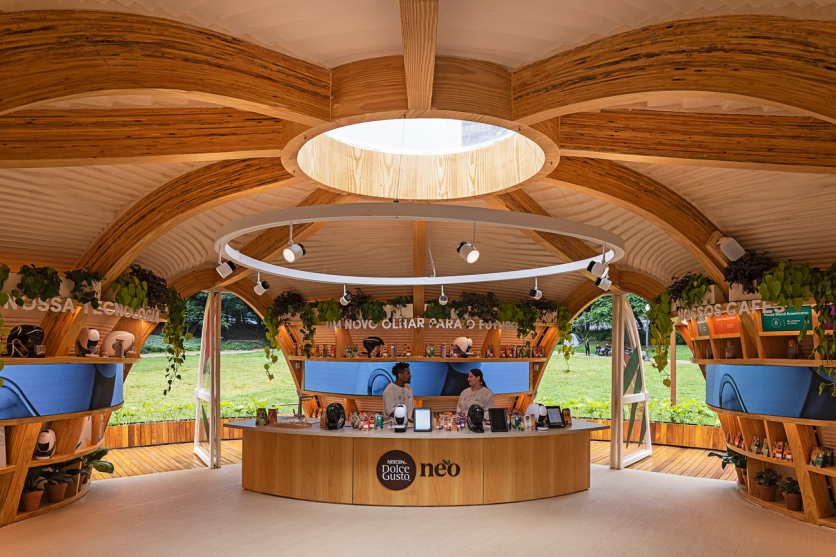The Nescafe's Dolce Gusto Neo store in São Paulo, Brazil, may have set a new standard for sustainable architecture and construction.
Designed by Estudio Guto Requena, this temporary commercial space located in a public park in São Paulo is a testament to innovation and environmental consciousness.
It was established to coincide with the launch of Nescafé's Dolce Gusto "Neo" coffee machines and pods, notable for their use of recycled ocean plastics and biodegradable capsules, Inhabitat reported.

Nescafe's Dolce Gusto Neo 3D-Printed Store in Brazil
What distinguishes this flagship store is its pioneering use of parametric design and biodegradable 3D-printed materials. Parametric design leverages algorithms to create intricate geometries, exemplified by the waffle-patterned base, milled with precision via a Computerized Numerical Control (CNC) machine.
This landmark makes it the first of its kind in Latin America. The structure combines glue-laminated timber (GLT) made from pine, carefully cut to reduce waste, with a lightweight 3D-printed shell.
Following its two-year tenure, the building will be disassembled. The wood will be recycled, while the biodegradable plaster shell will be crushed to yield a nutrient-rich powder, serving as agricultural fertilizer, enhancing soil quality with calcium and sulfur.
Inspired by the coffee flower's five petals, the store features a dome-shaped design along five axes, culminating in a skylight at the center, evoking a temple-like atmosphere and providing natural illumination.
This architectural marvel embraces regenerative principles and challenges conventional construction norms by showcasing the potential of renewable materials and cutting-edge 3D technologies.
Recycled Plastic From the Ocean
The building also involved the incorporation of recycled plastic from the ocean and biodegradable capsules within Nescafe's coffee machines, reinforcing their commitment to sustainability. Beyond its construction, the store embodies a forward-looking ethos, especially pertinent in light of the climate crisis.
"The design for the Dolce Gusto Neo Flagship unites innovation, sustainability and architecture," Estudio Guto Requena said in a statement. "The building architecture invites us to reflect on potential futures that we could design, especially given the climate emergency we are facing."
By pioneering the application of algorithmic 3D printing and utilizing renewable materials, this Dolce Gusto Neo Flagship store stands as a beacon of sustainable architectural innovation. Its impact extends beyond its physical structure, inspiring a re-evaluation of worldwide construction practices.
While the structure is set to be dismantled, its legacy will live on in the form of recycled materials and agricultural enrichment, underscoring the potential for responsible design in a rapidly evolving world.
Related Article : 'Chameleon Robots:' These Robots Can Change Colors and Mimic Their Surroundings Through 3D Printing

ⓒ 2026 TECHTIMES.com All rights reserved. Do not reproduce without permission.




